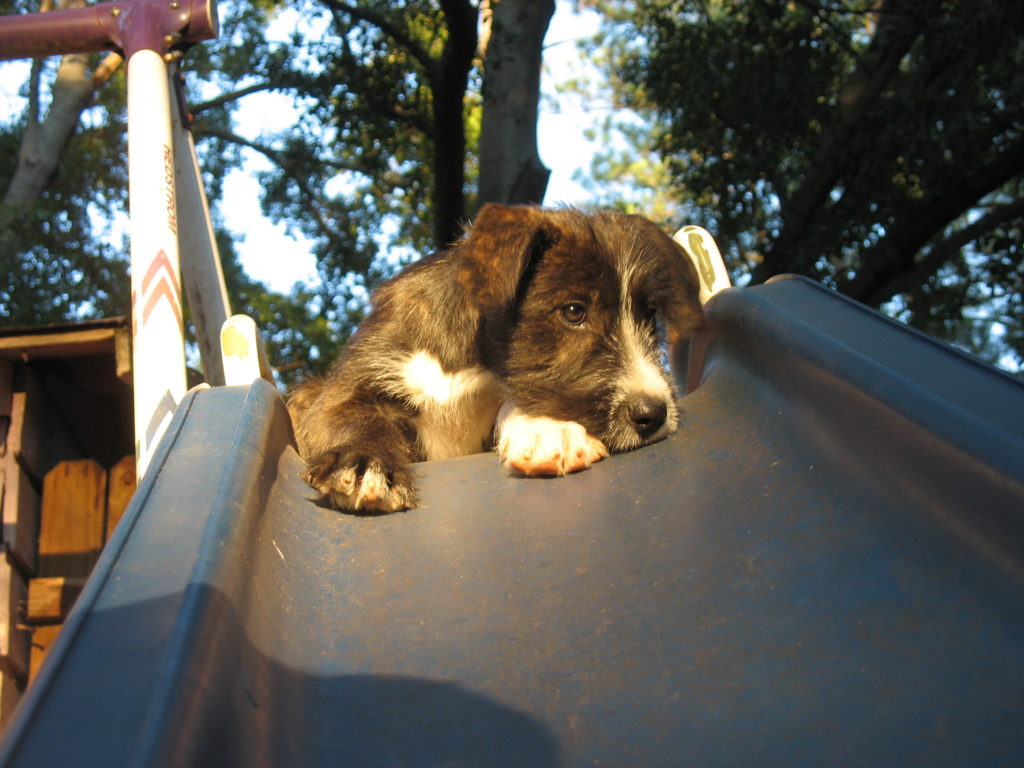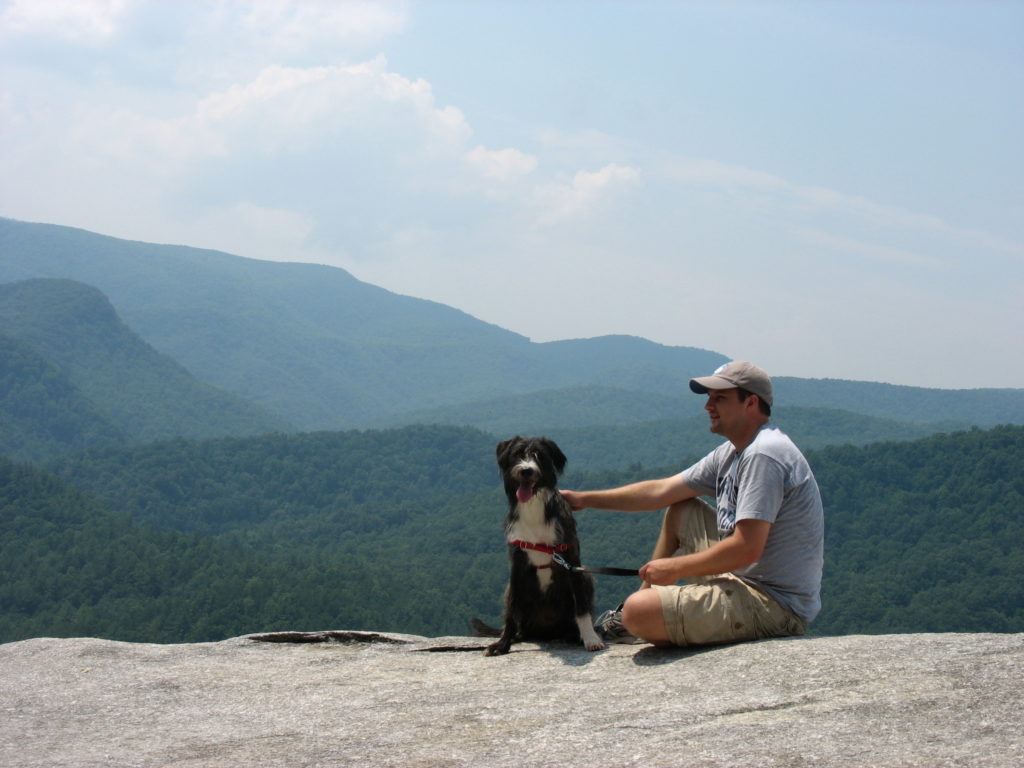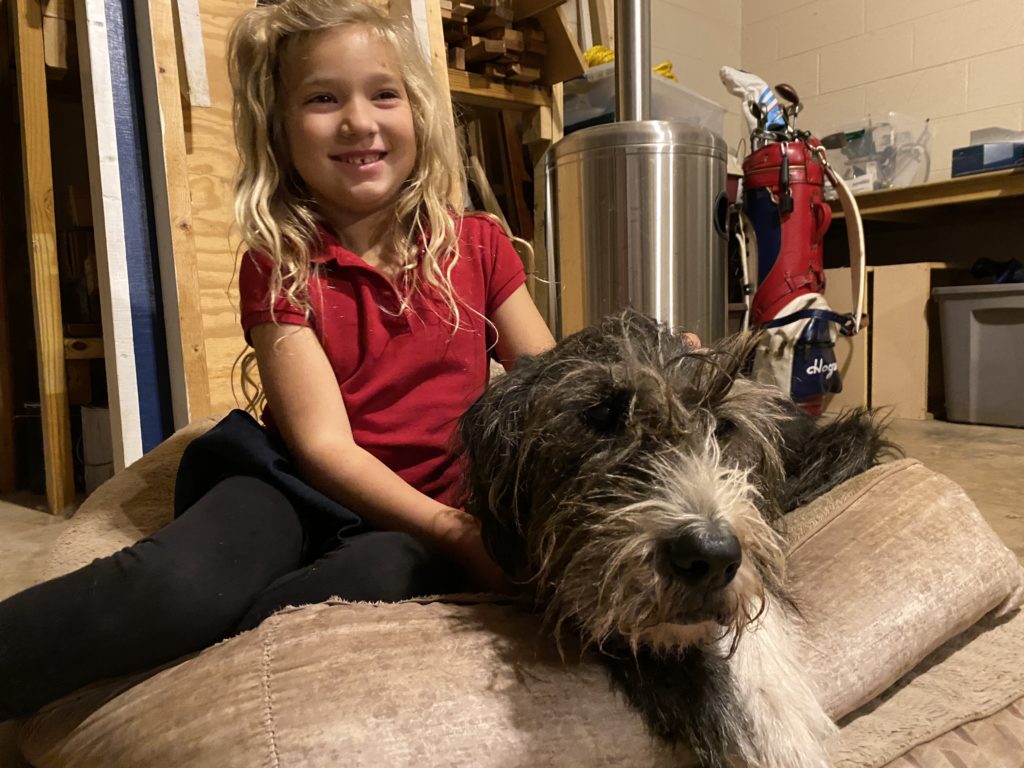
I find myself staring at a bag of dog food.
We buy it in thirty pound sacks, this median-grade kibble, a nutritional blend made especially for senior pups. It’s cheaper to buy on Amazon, and following some unknown interval, the hockey puck wizard device in the kitchen will light up, and I will ask it what’s wrong, and it will reply nothing, nothing serious–just maybe it’s time that you bought another thirty-pound bag of dog food? Shouldn’t we do that?
And more often than not I agree, and soon the gray, boxy van stops in front of the house, and someone schleps a thirty-pound box to our front porch. I break down the boxes and slide them under the Wagoneer to catch little drips of oil.
The most recent bag sits in the basement about two-thirds full. Around the corner, draped across two memory foam dog beds, our oldest pooch, Taylor, quietly naps, her breath slow and measured, the kind that comes with precious, deep sleep. There are pregnant pauses between exhale and inhale.
Taylor is fourteen and a half years old, or so we figure, officially listed as a mutt but with a majority dose of German wirehaired pointer on her dance card. Her coat is dark with shades of brindle underneath, but these days her muzzle is flecked with white and gray. There are cloudy spots across her eyes. She cannot hear very well, or maybe she stopped caring to listen.
Her hips are very much worn out; she struggles to lift or lower herself to and from her bed. She depends on her two, strong front paws to keep her on pitch, one paw dark, one paw white, as if she stepped in a can of paint.
Increasingly, she realizes much too late (if at all) when her bowels are moving. I will see in the morning that she has soiled her bed, or if there was time, the spot on the floor beside the bed. I never say a word, but I can see she is ashamed.
A few weeks ago I found her splayed out across the concrete floor of the unfinished basement, her hobbled joints useless, unable to stand back up. She can’t even bark for aid–in the last year her voice has collapsed into a thin, hoarse yelp.

I adopted Taylor in 2007 from a group of people who rescued her and a bunch of other dogs from a kill shelter. They brought these death-row refugees to Target of all places and set them up in a tiny pen by the entrance. There is a funny story about how, as I walked up to the store, one of the volunteers mistook me for another volunteer and handed me a leash and instructed me to help take the dogs to the curb to relieve themselves. Sitting in a corner amid the chaos that is a pen full of rescue dogs was little Taylor, a pup at the time.
It was October. I leashed her up and took her out and brought her back, and by that point the volunteer figured out I was not who she thought I was, and we laughed. And then I dumbly asked about the dog, and before I knew it I was filling out papers, and adding dog dishes and puppy chow to my Target shopping list. Taylor sat on my lap on the drive home, her nose nuzzling up against the steering wheel.
That winter was cold, but Taylor kept me good company. I would walk her at night, through neighborhoods I didn’t even know, the two of us pausing now and then to stare into lamp-lit windows and their other still-life worlds: retired folks sitting down to watch Jeopardy!, a teenaged girl playing a baby grand piano in a bay window, a toddler boy peering toward me.
Taylor became our before-we-had-kids puppy, the preparatory implement that young married people acquire to test their child-rearing mettle. We trained her, and we fussed when she chewed the downstairs rug or the bedpost. Deep inside her bones resided an irrepressible need to fetch. We brought her to the municipal soccer park, and I tossed a heavy frisbee as hard as I could, and she raced across the level grass like wiry lightning, ad infinitum in only the way a young dog can.
When Kelly was pregnant with Julia, Taylor would follow her around, sniffing her belly, nodding with understanding. The week our first-born arrived seven weeks premature, we had to leave her in the house while I went back to Winston to the hospital, and she grew so nervous she knocked a windowpane out in the dining room. After we brought four-pound Julia home, Taylor never flinched or growled or betrayed even a shade of jealousy. She simply offered a wet kiss.
As our family grew, she learned to be more than self-sufficient. We moved to our current house, with its place in the basement that she could call her own. I cut a little door for her to go in and out. With each child, she became more of a shadow–there about the yard, or curled upon the deck, or nosing along the fence, part of the background as we aped about taking snapshots of the kids.

Last Christmas break, we gave Taylor a bath and bought her a new doggie bed and insisted upon keeping her nearby and doting on her. I knew then that thirteen years was a big number for a dog her size. She napped by the fireplace while we opened presents, lifting her head now and then to see what the fuss was about. Soon enough, the kids went back to school, and we moved her bed back into the basement.
A few weeks ago, I saw her limping terribly in the yard. She’d strained one of her front paws, and as much as she relied on it, she struggled to make it in and out. Quietly, I watched her, noticing all at once how old she had grown, how she mostly kept to her bed, venturing only to certain spots in the back yard, avoiding the deck entirely. She had developed an occasional tremor, which sometimes shook her jowls so much her teeth chattered. The lightning sprinting dog was reduced to a tiny spark of herself.
I remembered the words our veterinarian had told us once, about another one of our puppies who had made it deep into teenage years. Sometimes, she had said, it’s better to help out our pooches when they’re near the end, to allow them their dignity. The phone call was brief; Taylor could come in for a quality of life visit on Wednesday.
I had to hoist her into my car. She trembled the entire drive, stopping fearfully in the parking lot before we walked inside, almost as if she knew what this was all about. I coaxed her forward, scratching behind her ears as if I were Judas.
The doctor, whom I’ve known since high school, confirmed with tender care what I had suspected. Her heart was strong, but so many other parts of her were breaking down. Whatever future our little rescue pup had left was not likely to be substantively better than what we had here. The vet explained in simple terms what the options were and how they worked. That I could let them know when I was ready. I walked her back to the car, aware suddenly of how everyone was watching us, the middle-aged man and the dog that reminded him of when he was young.
So here we are, back at the bag of IAMS brand senior kibble, two-thirds full. It is an hour glass of sorts, perched upon a wicked table, meting out time in bowlfuls.
Soon I will have to tell Alexa to never remind me to buy dog food for her again. At some point, the Wagoneer will start dripping oil on the floor. It feels devastating and silly to think this way.
But it is Advent, the season of waiting and anticipation, of throwing open the aching doors of our hearts and staring through inky midnight, the cold washing over our feet, as we cry Emmanuel. In church, there are lessons and carols about beginning times and end times. There is no lesson about mustering the courage to do what I am so afraid to do.
There is more painful, awful truth. In a few weeks we will be moving away, taking our lives up to the mountains and to a place where there is no basement and no dog door. God forgive me, dear reader. I know what this looks like. Guilt has been following me around like–like, well… .
Death isn’t linear, no matter if it’s human or canine. There are good days and bad. In the days since her doctor visit, Taylor has had many good days, which makes this all the more vexing.

We carefully begin introducing this chapter of our dog’s life to our children. The older two catch on right away. Annie, bless her, does not, not at first. “So Taylor will go to the vet?” she asks over dinner.
“Yes, she’ll go to the vet, and the doctor will give her medicine, and she will fall asleep.”
“And then what?”
“Well,” I pause, glancing at Kel, who says, “That’s it.”
“Wait, so she won’t wake up?” Annie asks, the world in sharp focus.
I shake my head no, and I see tears filling our youngest daughter’s eyes, and she simply gets up from the table and walks away without a word, and the grief of knowing I’ve broken our little girl’s heart throws me into a violent sea.
In the days since, I have prayed for Taylor to simply not wake up on her own, without me having to do anything.
I have tried to rationalize this, to bargain with the universe, to think that she had almost been euthanized as a throw-away puppy, that every breath since was one she wouldn’t have otherwise had, but then the universe reminds me of the Samaritans who saved her and brought her to Target and quite literally put the leash in my hand, and the universe makes my rational thinking seem inconsolably small.
My breath catches as Annie announces she is going to go check on Taylor and comes back upstairs to report in a bright, tinsel way that Taylor is fine, Taylor is happy, her tail is wagging, Daddy!
I thought at first I would call the vet and ask about Friday, or maybe Saturday morning, but I don’t, and then I figure maybe it’d be easier to bring her back to the doctor in the middle of the week, but then my heart crumbles at the idea of the children sitting through the school day mourning what I’ve done.
Another day passes, and it is clear I don’t know what to do. I am forty years old, I am a husband and father of three children, a college administrator, a homeowner, a volunteer board member, and I cannot figure out what to do with a fourteen year old, incontinent dog with bad hips, because I love her too much, and she is more than her four paws add up to: she is an extraordinary witness to a span of life that even I cannot begin to adequately measure.
“I can’t believe you’re going to kill our dog,” Julia says matter-of-factly at lunch one day. I respond that I couldn’t possibly do such a thing.
“Fine. I can’t believe you’re going to pay someone else to kill our dog.” And the statement is so shocking that we all begin laughing at the absurdity of it, at the way it detaches us all from this brooding moment and lets us breathe. Even Annie is laughing.
This Advent gestated into a meditation on the purple bruise of heartache, the greenery wreath at church a simple circle, showing us again and again the ancient patterns our lives must follow, leading us to a creche where even birth is wrapped with death.
God forgive me, dear reader, I am afraid. In all of this darkness and waiting, I am afraid, and I don’t know what to do. There is nothing to do but wait, even if there is only so long to wait, and pray for victory o’er the grave.






Leslie Marsicano
I really shouldn’t read your evocative postings at work since I so often end up teary . I will be thinking of you and your family through this season of so many transitions with all best wishes.
Jenneffer Sixkiller
I was literally just about the say the same thing. I’m heartbroken with you. I watched my rescue dog (who found me, by way of a cat door at an ex-boyfriend’s house) be attacked, viciously, by a pit bull, who bounded out of our new neighbor’s backyard gate, just before Usoa and I (who was 2 at the time) had finished taking Fred for his morning walk. I was so helpless, I yelled help as loudly as I could, alerting the neighbor, who ran out in her pajamas, but the damage had been done. He made it through the night, but lungs were punctured so badly, he died before noon. This happened right before the pandemic shut everything down. I still grieve for him, and when I read your story, I realize the pain is still just as acute as it was in the spring of 2020. My heart and prayers are with you and your family <3
Catherine Atkin
I am praying for you and your family !
I follow Kelly on Instagram but you sir I stop in to read you writings when everything seems so out of control!
I would say you are the smartest most compassionate man who writings clearly show all those traits.
Your wisdom will guide you down the right path!